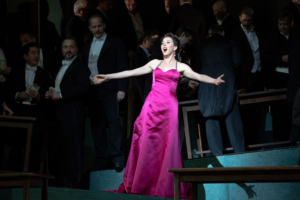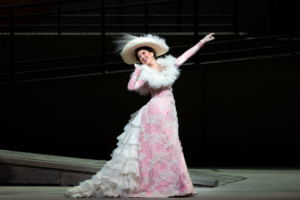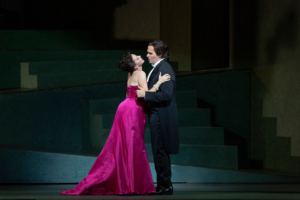Review: The Met's MANON a Showcase for the Charms of Tucker Award-Winner Lisette Oropesa

Lisette Oropesa, where have you been all my life?
Of course, I've heard her before--she's appeared 100 times or so at the Met so one could hardly miss her--but never in a showpiece like the title role of Jules Massenet's MANON, opposite tenor Michael Fabiano's Chevalier des Grieux, on the second night of the Met's new season.
As Manon, Oropesa showed off her voice's clear, clean, pretty top...but make no mistake: She is not simply a songbird. The voice has some heft to it (ok, she's no Brunnhilde in the making). And she's also a fine actress: Oropesa is about the only one I've heard as Manon (or its step-sister, MANON LESCAUT by Puccini), who could pull off the girlish 16-year-old of Acts I & II and not seem frumpy or ridiculous. When librettists Meilhac and Gille say "no voice could be sweeter...no face more enchanting," they could have had Oropesa as their model.

Photo: Marty Sohl.the Met
In the famed Cours-la-Reine scene that starts Act III--staged something like Cecil Beaton's Ascot Gavotte in the original MY FAIR LADY--it's interesting to see the change in Oropesa's demeanor: there isn't much. Usually, the Manons I've seen have become grand dames by this point--I particularly recall the portrayals of Beverly Sills and Anna Netrebko--but in Oropesa's account, she is still the teenager at heart with an eye on pleasure, but despite the fancy clothes, it's like she's wearing her older sister's gown.
This seems more in character in a story that appears to unfold over very few years, even though, by Act III, the girl can wrap any man she wants around her finger, with Oropesa singing gorgeously about the joys of love and wealth in "Obeissons quand leur voix appelle." Oropesa is a pleasure to hear and see, even when she expires at the end of Act V on a road that looks like a stretch of an LA freeway. (This Manon never gets to America, to expire in the desert of Louisiana as in MANON LESCAUT.)
The place where the production falls short--at least in this iteration--is the big scene in the church of Saint-Sulpice, with Fabiano's des Grieux now a priest rather than a nobleman. Back in Act I, des Grieux falls madly, passionately in love at first sight with the teenage Manon; the French call it "un coup de foudre," a thunder bolt. His ardent singing is clearly enough to sweep the young girl off her feet and into his garret.

Photo: Marty Sohl/the Met
The trouble is that he holds onto this high intensity and urgency with very little variation (even though there are places it's clear he knows how to do this). That is, until we enter Saint Sulpice, where he has turned to the priesthood after Manon looked for better opportunitities, once pere des Grieux, le Comte (the fine bass Kwangchul Youn), has his son kidnapped in order to put him on the right path for a young nobleman.
But in Fabiano's portrayal, religion doesn't seem to have done anything to cure his heartbreak over Manon's departure; rather it seems to have made things worse, making him seem more crazy than lovestruck. His Abbe des Grieux (as he is now known) is not simply woebegone but has become unhinged. (This doesn't appear to affect the admiration of the ladies in the congregation, who seem to find him ravishing.)
When Manon arrives at the church, after finding out his hiding place (she tries praying before he appears, but can't quite get the hang of it), he doesn't seem the least bit tempted by her until she does quite a lot of work. Even when he begins to loosen up, there is not a whit of chemistry between them (you had to see Damrau and Grigolo for that). The young couple reconcile, all right, but I was not convinced for a moment.
Once he realizes that has to start taking care of Manon in the style to which she'd like to be accustomed, des Grieux is enticed to a gambling house--the worst of the production's scenic designs, by the way--by her low-life and flighty but seductive cousin Lescaut (the hearty baritone Artur Rucinski).
Manon brings him luck, time after time, to the consternation of Guillot (tenor Carlo Bosi), the old goat who would like Manon on his arm. (He would really take any young thing, like the opera's three delightful gold diggers: the Pousette of soprano Jacqueline Echols, the Javotte of mezzo Laura Krumm, both in their boisterous Met debuts, or the Rosette of mezzo Maya Lahyani. (The trio, for their part, are ready to change lobsters and dance with anyone rich enough to keep them in high-priced gifts.)
Guillot becomes enraged when des Grieux continues to win and calls the police, accusing the Chevalier of cheating. His rich father, le Comte, gets him off but Manon is sent to jail as an accomplice, never to rejoin the world of pleasure she has always craved, despite des Grieux's and Lescaut's best efforts.
The Laurent Pelly production from 2012 was designed by Chantal Thomas (lighting by Joel Adam), and it's rather plain. It's as if Pelly was saving his budget for the glamorous costumes--which he himself designed, when he wasn't busy directing the opening with Netrebko and Piotr Beczala. (This time around, it was staged by Christian Rath to Lionel Hoche's choreography.) The costumes indeed were first-rate.
Conductor Maurizio Benini kept things moving along, all right, but might have gotten a crisper performance from the Met orchestra. The chorus, however, under Donald Palumbo, was in peak form.
So, MANON or MANON LESCAUT? There's not a choice at all between the operas: two complementary treatments of the same story. Massenet and his collaborators may win by a nose, for giving us a more straightforward account of the story, but Puccini...ah, Puccini.
Further performances of MANON will take place on September 28 at 12:30, October 2 at 7:30, October 5 at 8, October 19 at 8, October 22 at 7:30 and the October 26 matinee at 1, which will be broadcast live to 2700 theatres around the world as part of the Met's Live in HD series. For more information see the Met's website.
Comments
.png)
|
.png)
|
Videos


